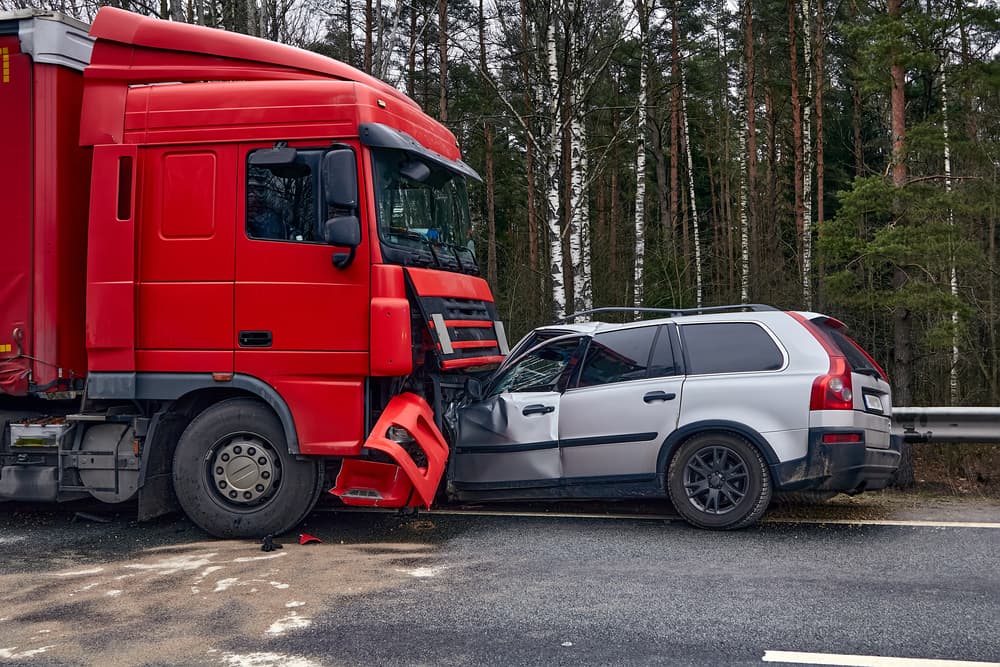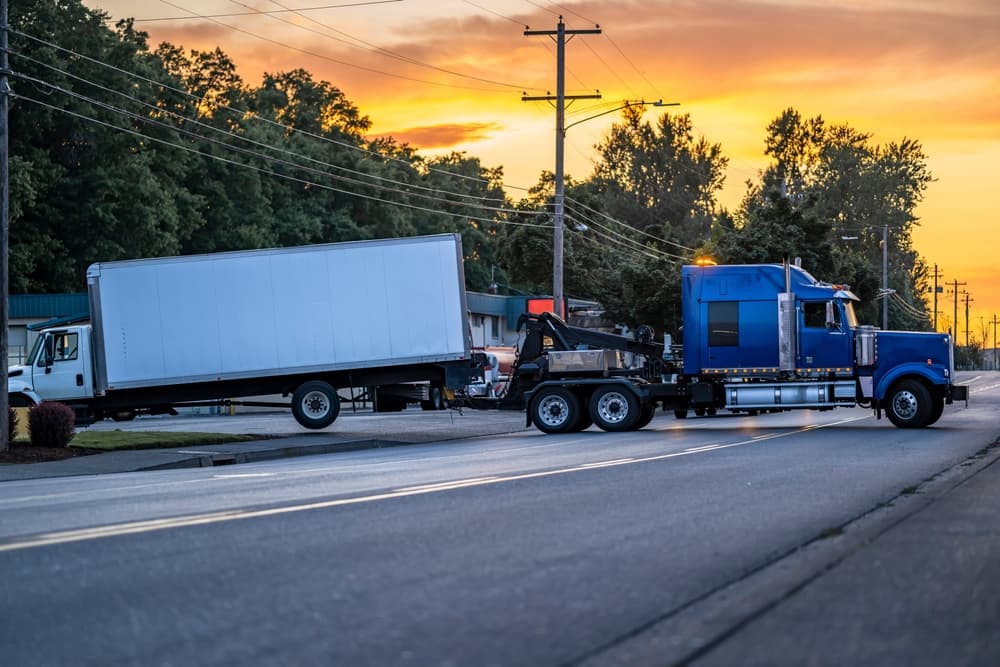Nearly three-quarters of the products individuals use come to their area on commercial trucks. The economies of cities and towns across the U.S. rely on truck transport. However, the trucks that provide transportation services to businesses and consumers are much larger than other vehicles on the roadway. Their size poses many hazards, including the potential of a rollover accident that can trap other vehicles beneath it, collisions with the wreckage in a secondary or chain-reaction accident, or collisions while trying to avoid a hazard. Usually, however, truck driver and trucking company negligence cause trucks to roll over.
Why Commercial Trucks Are Prone to Rollovers?
Commercial trucks commonly referred to as semi-trucks, 18-wheelers, or tractor-trailers are massive vehicles, measuring about 72 feet long, 8.5 feet wide, and 13.5 feet tall. Because of the truck’s height, the center of gravity is higher than in passenger vehicles. This makes it easier for the truck to roll in certain circumstances, such as when the driver attempts to negotiate a tight corner or curve in the road. This is particularly true when the truck is fully loaded, meaning the additional weight of the cargo is higher off the ground. It can be subject to other factors such as shifting cargo, resulting in a lopsided load. While taking sharp corners with a full load is one of the ways a truck can roll over, other factors can either contribute to a rollover or even cause one. These include:
- Emergency driving maneuvers, such as swerving. A truck driver is at a distinct disadvantage if someone pulls out in front of them, and they need to take action to avoid a collision. Because the truck can weigh up to 80,000 pounds when fully loaded, it can travel up to 40 percent further than a passenger car after the driver has depressed the brakes for the brakes to pull the vehicle’s weight to a safe stop. However, suppose a driver knows they will be unable to stop the vehicle before a collision and attempts to swerve to avoid this collision. In that case, they risk causing the truck to roll over.
- The truck is “tripped.” Most rollover accidents are tripped accidents, including 95 percent of single-vehicle rollovers. This means that the driver begins losing control of the vehicle, and the tires begin sliding sideways before colliding with a median, a guardrail, or even another vehicle. The truck then “trips” on the obstacle and rolls over.
- Speeding, which makes it more difficult to control the vehicle, leading to shifted cargo, oversteering, and other sudden actions by the driver that can cause a rollover. Speeding also deprives the driver of the time they need to perceive a hazard and cautiously respond to it through gentle braking and steering.
- Operating the vehicle in high winds, which can cause untripped rollovers.
How Common Are Truck Rollovers?
According to the Federal Motor Carrier Safety Administration (FMCSA), the government agency responsible for overseeing and regulating the trucking industry, truck rollovers account for around 2 percent of all accidents involving commercial trucks and 4 percent of all fatal trucking accidents. More than 5,000 people a year are killed due to accidents involving commercial trucks, and many thousands more are injured.
Who Is Liable for a Truck Accident?
If an individual is injured or has lost a loved one due to a truck-involved accident, they can seek compensation for their injuries through the personal injury or wrongful death claims process. However, to have a successful outcome to that claim, they must prove that someone else was liable for the accident. Because commercial trucks are so large and the risks to other roadway users are so high, the FMCSA and other governmental transportation agencies heavily regulate the trucking industry. Because of this regulation, determining liability can be tricky. Many truck drivers work as independent contractors or owners/operators. Because of these designations, if they cause an accident, they are liable for the physical harm and property damage caused to others. However, if the negligent truck driver is an employee of a trucking company, liability for the accident often falls on the trucking company. Trucking companies must fulfill several responsibilities for ensuring safe drivers and vehicles. These tasks include:
- Assessing the driving history of prospective drivers and ensuring they have the proper license to operate the vehicle on public roadways. A truck driver must obtain a special license known as a commercial driver’s license (CDL) to drive a commercial truck. To obtain a CDL, the driver must prove that they know the basic skills of operating the vehicle and the federal requirements involved with the job. They must also pass a physical examination to show that they are medically qualified for the job and submit to annual drug and alcohol screenings. They must also maintain a clean driving record. Additionally, suppose the driver is transporting hazardous materials. In that case, they must obtain additional training to obtain a hazmat endorsement on their license.
- Providing proper truck insurance. Commercial trucks must carry more liability insurance to adequately compensate those injured due to a truck driver’s negligence. Because the commercial truck is so much larger than other vehicles on the roadway, most deaths and injuries from truck-involved accidents occur to other roadway users, such as the occupants of other vehicles, motorcyclists, bicyclists, and pedestrians. The amount of insurance required depends on the truck’s size and the materials it transports, with trucks carrying hazardous materials requiring a higher amount of insurance than those transporting other goods.
- Committing to a regular maintenance schedule for the truck. Most long-haul commercial trucks travel thousands of miles each week, often with the truck fully loaded. Both the mileage and the weight cause parts of the vehicle to wear more quickly than they would on passenger cars. Because of this, the tires, brakes, and engine require frequent maintenance.
- Ensuring that the driver knows how to handle the day-to-day rigors of the job, including how to properly avoid collisions and make wide turns to avoid the truck rolling over. Drivers are also required to perform a pre-trip inspection of the vehicle before every trip to look for visible signs of wear or broken parts that can cause the truck to malfunction and increase the likelihood of a truck-involved accident.
- Ensuring that the driver adheres to hours of service regulations, which require commercial drivers to take regular breaks during their on-duty time so that they are well-rested and not prone to making errors due to fatigue that would cause a rollover accident.
A company is responsible for employee actions when they are on the job and representing the company. This makes the trucking company liable for issues in the driver’s control, such as truck rollovers caused by the driver choosing to speed in high winds despite the risk of the truck tipping over.
Other Potentially Liable Parties
Truck drivers and trucking companies are not always liable in a commercial truck accident. Other roadway users can also cause truck-involved rollover accidents by pulling out in front of the truck or cutting them off, causing the truck driver to swerve to avoid a collision. Additionally, defective truck parts can also result in rollover accidents, such as defective tires that blow out and cause the truck to pull wildly and unexpectedly to one side. If a truck rollover results from a defective part, you can hold the manufacturer liable. In some circumstances, if the shipper loaded the truck’s trailer incorrectly and left a weight imbalance, the shipper can also share in the liability for a truck rollover accident.
Proving Liability
To prove that someone is liable for the injuries or loss you incurred due to a truck rollover, you must show:
- The at-fault party had a duty to take reasonable actions in a given circumstance to avoid causing physical injury or property damage to others. To avoid a truck accident, the driver must operate the vehicle under federal, state, and local trucking and traffic laws; the trucking company must ensure the driver is qualified to operate the vehicle; other drivers must obey traffic laws and use caution when passing commercial trucks; and manufacturers must make safe parts when used according to labeled instructions.
- A breach in the duty occurred when the at-fault party took action or failed to act in a manner conducive to avoiding causing harm to others.
- This breach resulted in a truck rollover accident that injured you.
Do You Need an Attorney for a Truck Rollover Claim?
A commercial truck rolled over and caused you to become injured. Wouldn’t it be simple to just file a third-party insurance claim on your own? How could the insurance company possibly dispute the cause or severity of your injuries? Truck accidents are deceptively complex. Even when the truck driver committed the error that caused the accident, determining and proving liability is far harder than necessary because:
- The federal regulations placed on the trucking industry, which require the driver or the trucking company to maintain logs, event data recordings, service records, and licensing information about the driver. However, because this information is in the hands of the driver or company, it isn’t always easy to obtain and is prone to get “lost” during the claims process.
- High-powered insurance companies that provide big policies to truck drivers can resort to questionable tactics to avoid large payouts caused by their insured’s negligence. These tactics include offering ridiculously low settlements and stating to a claimant who doesn’t have an attorney that it is all the compensation that is available for the claim, telling the claimant that non-economic damages (compensation for the psychological impacts of the injury) are not available for them, convincing the claimant to release their full medical history to the insurer, or trying to place the blame for the accident on the claimant.
- Difficulties with the legal process. Do you know what discovery is? How about a deposition, maximum medical improvement, or the statute of limitations? Most individuals do not know the legal terminology used in court processes because they have little reason to. However, suppose you handle your truck accident claim yourself. In that case, you must know these concepts and how to apply them to your claim. What’s more: you can bet that the legal counsel for the trucking company and their insurance provider knows all of these terms and many more that can impact your claim.
Having an experienced truck accident lawyer help you with your claim ensures that you have experience on your side. Your attorney understands the evidence needed to prove your claim and how to obtain it. Your truck accident lawyer will also know the legal requirements you must meet to seek compensation for your injury. They will know how to value your claim and deal with common insurance company tactics. Finally, your attorney can help you understand the process you need to make important decisions about the status of your case.


